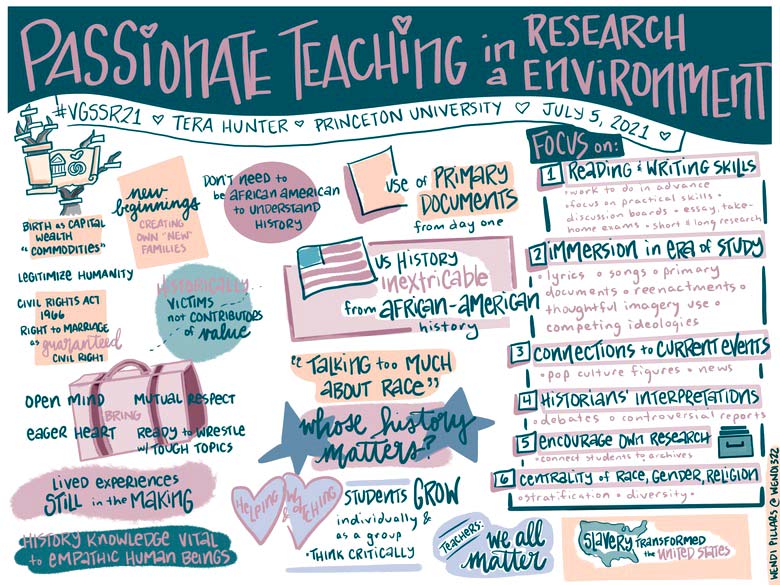page
Meaningful Teaching and Learning in the Humanities Classroom
July 11–15, 2022

Since 2015, the National Humanities Center has offered graduate students in humanities doctoral programs an opportunity to learn about and experience best practices in teaching and learning.
Each year, a cohort of students working in small teams creates group and individual instructional materials. Focusing on translating research into practice, students are given guidance on how to create meaningful learning experiences for any level audience in sessions led by prominent scholars, master educators, and technology experts. Most importantly, the design of the residency requires direct and collegial work among students from different universities and disciplines, creating opportunities to engage with a much broader network of humanities professionals.
Program Overview
Topics will include:
- Open Education Resources (OER)
- Online Course Design and Instruction
- How to Build Community and Relationships
- Interactive Teaching Technologies
- Student Assessments
- Class Evaluations
- Understanding Copyright in Publication and Instruction
- Finding Support for Work-Life Balance
- Job Market to First Job
Program Goals
 The Graduate Student Residency Program focuses each year on a specific pedagogical theme paired with an emerging instructional technology tool. Participants are also introduced to learning science theory to better inform their instructional design and lesson writing.
The Graduate Student Residency Program focuses each year on a specific pedagogical theme paired with an emerging instructional technology tool. Participants are also introduced to learning science theory to better inform their instructional design and lesson writing.
Throughout the program, participants will work in cross-university and interdisciplinary teams to create instructional materials for their teaching portfolio by applying these skills. Sessions will be designed and led by established scholars in the humanities who can model innovative uses of instructional technology in their research and their teaching. Workshops will provide participants with hands-on experience in connecting their own research to practice.
The primary goals for this program include:
- Working with a diverse team to identify and map solutions to an instructional challenge
- Identifying a compelling topic from research and scholarship to develop instructional materials
- Training participants on the development of classroom-ready materials for the university classroom, including familiarizing them with the most recent research on learning sciences
- Providing structured feedback on the practice and implementation of writing for a broader audience rather than solely an academic one
- Writing, revising, and publishing classroom-ready lessons in the Center’s digital repository. These materials will be freely and openly disseminated to the full network of NHC educators. Student authors will receive full citation.
- Developing skills that are marketable and valuable in the job search
- Bolstering participants’ CVs through selection to and completion of the National Humanities Center’s Graduate Student Residency Program
More than simply developing a strong pedagogical understanding, this program will also provide a broader introduction to the Center and its work in humanities education and outreach. These activities will aim to:
- Integrate the work of the internship to provide more access to ongoing Center initiatives and workplace culture
- Identify a theme with strong cross-disciplinary opportunities that encourages advocacy and outreach at the school, university, and national level
Application Process
Students are nominated into the program by their home institution. The National Humanities Center will accept up to ten (10) students per supporting institution. NHC staff work with university representatives to develop recruiting materials, including an orientation meeting with faculty and students. The program quickly reaches capacity so participating institutions are encouraged to indicate their interest and submit applications as soon as the application portal opens.
Once selected, students will work with NHC staff to complete all required paperwork and prepare for the residency program. Participants will also participate in a short welcome orientation video conference and receive a detailed syllabus.
The tuition cost per participant is $750 and covers all programming for the NHC Graduate Student Residency Program.
For more information, contact Andy Mink, Vice President for Education Programs.
Next Steps and Timeline
- Interested university representatives should complete this commitment form to reserve up to ten spots in the program.
- April 29, 2022: University partners submit the names of nominees for participation in the program.